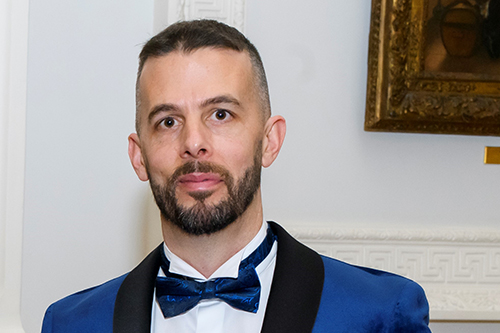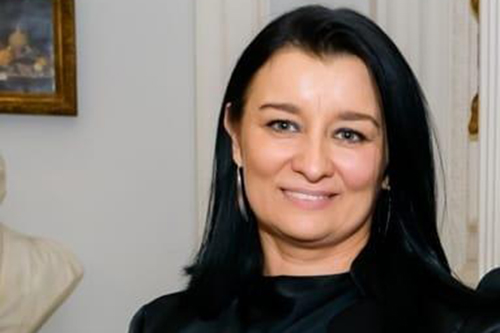Executive Master’s in Leadership
Key Information
Eligibility check form: Click on the Apply now button to check if you are eligible to apply for the September 2024 Intake.
Onboarding application: The link for eligible candidates to apply will officially open from Monday, 4th March 2024.
Closing deadline: Monday, 5th August 2024
Delivery: Part-time
Total UK credits: 180
Total ECTS: 90
Fees: £14,000* - eligible organisations will be able to use £14,000 of their apprenticeship levy funding to cover the overall cost
*Covering tuition fees and End Point Assessment
The Executive Master’s in Leadership is only available to study using apprenticeship levy funding in England only. For more information please contact Ruth Velenski: Ruth.Velenski.1@city.ac.uk.
Programme summary
The Executive Master’s in Leadership is a 2-year part-time (Friday and Saturday once a month), block taught programme designed for leaders and managers from any industry and sector and a variety of academic backgrounds. The Business School offers this academically rigorous and professionally relevant programme under the apprenticeship levy funding scheme to help employees improve their management skills and competencies.
Who is the Executive Master’s in Leadership for?
The programme is designed for aspiring leaders and leaders with a good first degree or a relevant professional qualification and at least 3-5 years' work experience in a senior role.
Programme Schedule and Modules
The programme is taught in person and delivered in a flexible, block-taught format, integrating both classroom and work-based learning over a period of 24 months. The content is designed to develop employees’ skills as leaders and team players and enable them to demonstrate both strong personal skills and sound technical knowledge.
Year 1 modules
Term 1: September - December
Induction (not a module)
1. Leading People and Change
2. Principles of Marketing & Strategy
Term 2: January - April
3. Personal Leadership Development for Experts and Professionals
4.Accounting and Finance for Business Leaders
Term 3: May - June
5. Advanced Strategy Analysis
6.Work-Based Leadership Impact Project (Part 1)
Year 2 modules
The second-year builds on what was covered in year one by developing key areas of specialist content which are important for leadership and management roles across multiple industries.
Term 1: September - December
7. Managerial Economics and Human Resource Management for Leaders
8. Operations and Supply Chain Management
Term 2: January - March
9. Digital Technologies and Business Innovation
10. Work Based Leadership Impact Project (Part 2)
Term 3: May - July
Writing up and submission of Work Based Impact Project
July - September
Apprenticeship End Point Assessment - Leading to Chartered Management Status with CMI.
Coaching: You will benefit from up to 8 coaching sessions per year. These will form part of the termly Tripartite Reviews and will be tailored to your individual needs and personal goals.
Work-based Leadership Impact Project
All students will undertake a dissertation in the form of a work-based leadership impact project, which brings together elements of the programme, demonstrates their accumulated knowledge and understanding of management and leadership, and addresses a business issue of direct relevance to their employer.
This will be submitted before the end of July of the second year.
The Apprenticeship End Point Assessment (EPA) will be completed by the end of September of the second year.
Accreditation and Awards
- Senior Leader Level 7 Apprenticeship
- Chartered Management Institute membership
- Masters in Science (MSc).
Graduation: The ceremony will occur in January the following year, after the successful completion of the Masters degree and the Level 7 apprenticeship.
* modules and dates are subject to change
Benefits to your organisation
The final component of their degree will be a work-based leadership impact project, which will demonstrate their understanding of management and leadership and its application to their own organisation.
Successful completion of all requirements means that students will achieve a Master’s in Science degree as well as a Senior Leader, Level 7 Apprenticeship award. They will also be eligible for professional accreditation from the Chartered Management Institute (CMI).
Faculty and Team biographies
Professor Ajay Bhalla

Ajay Bhalla is a Professor of Family Business and Innovation at Bayes Business School (formerly Cass). Since joining Bayes in 2001, his research and teaching has focused on leadership, succession and governance in family businesses, employee owned businesses, and digital transformation and innovation.
He is passionate about helping boards and executives discover (a) why resilience is vital (b) the challenges they face in current times and (c) how they can prepare better for tomorrow by nurturing capabilities they need to build lasting businesses.
Matt Bungay
Head of Apprenticeships
 Utilising the Apprenticeship Levy gives you access to a fully funded MSc, directly related to making an impact in your business! New Knowledge, Skills and Behaviours learned on the course will be directly applied to your business, enabling you to see the instant benefit”.
Utilising the Apprenticeship Levy gives you access to a fully funded MSc, directly related to making an impact in your business! New Knowledge, Skills and Behaviours learned on the course will be directly applied to your business, enabling you to see the instant benefit”.
Ilona New
Apprenticeships Team

Ilona is the Quality Assurance Officer for Apprenticeships at Bayes. She is an expert in end point assessment for level 7 Senior Leadership and supports all apprentices throughout the course with her team of assessors.
Ruth Velenski
 Ruth is Head of Corporate Development within the Business School and is responsible for developing and managing corporate sponsorships and corporate partnerships between the Business School and a range of companies.
Ruth is Head of Corporate Development within the Business School and is responsible for developing and managing corporate sponsorships and corporate partnerships between the Business School and a range of companies.
Previously she was Head of Campaigns with responsibility for identifying, designing and implementing fundraising initiatives to support key academic centres across the business school.
Since 2017 Ruth has been playing a significant role in helping to promote and attract doctors to the Executive Master’s in Medical Leadership (EMML) from across both the NHS and Private Health Care sectors and has established a number of significant partnerships in this respect.
I had a fantastic experience in the Executive Master's in Leadership program at Bayes Business School - City, London University. The course material was very well-structured and delivered by knowledgeable and engaging professors. The program provided a great balance of theoretical and practical learning, allowing me to apply the concepts directly to my job. The diverse cohort brought a wealth of perspectives and experiences to the table, making the group discussions and projects even more enriching. I highly recommend this program to anyone looking to enhance their leadership skills and take their career to the next level.
- Álvaro Lozano Fuentes, EML 2022
